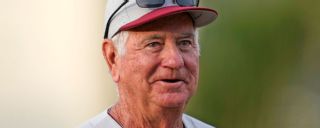|
Editor's note: Florida State advanced to the College World Series on Sunday with a 5-4, 12-inning victory over LSU. TALLAHASSEE, Fla. -- He met his future bride when they accidentally knocked heads at the water fountain in high school. After apologizing, Mike Martin looked at her and thought, "That's one good-looking woman!" Three years later, Mike and Carol married, and they set off for their honeymoon in his 1963 Falcon. The Falcon had 83,000 miles on it and no air conditioning, but it would have to do for this trip. They left Charlotte, North Carolina, and drove south down country roads and a few bigger highways, passing through Athens and then Macon in Georgia, before eventually hitting Thomasville Road, its moss-covered trees making it hard for the young couple to believe they had arrived at their final destination. Tallahassee had none of the palm trees or tropical landscape they envisioned when they left for Florida. But it hardly mattered once they arrived on campus at Florida State University in June 1964. Mike had the opportunity to transfer there to play center field on the baseball team, and as he and Carol looked around, they decided they would stay. Fifty-five years later on a humid Mother's Day afternoon, Mike and Carol walked around the baseball field that now bears his name, greeting fans that turned out for his final home game after a 40-year career as Florida State's baseball head coach. The game capped a weekend that included a celebration for Mike in which 600 people turned out, including former players from across the decades, each sharing a story that personified how he changed their lives. Mike Martin changed Florida State too. Nobody has more career wins than the 75-year-old in any NCAA sport (2,022). His teams have won 40 or more games and made the NCAA tournament every year he has been head coach. This season, however, has not come so easy. Headed into ACC tournament play Tuesday in Durham, North Carolina, Florida State (35-20) needs to make a run to keep both streaks alive. Perhaps the Seminoles launch a long shot bid at the College World Series. Perhaps they fall short of 40 wins. No matter how this season ends or when, Martin has his place in college baseball history. Whether anyone can top what Martin accomplished will be subject to debate for years to come. "I don't even know how to contemplate or fathom it all," said former Seminoles slugger J.D. Drew, the only player in Division I history to hit 30 home runs and steal 30 bases in one season. "It doesn't make sense to me, because nobody does it. When you continue to churn it out year after year, it's remarkable, and the one commonality is the head coach. "His dedication to the game and to the level of the game ... he created this atmosphere. We're all looking at 2,000 wins and how miraculous this is and, "Oh, it must be nice to be Coach Martin.' He literally transformed Florida State baseball into what it is." Martin is Florida State baseball, a coach as synonymous with his team as Bobby Bowden is with Florida State football. Their longevity and sustained excellence, oftentimes simultaneously in the 1980s and 1990s, transformed a regional school into a national brand. 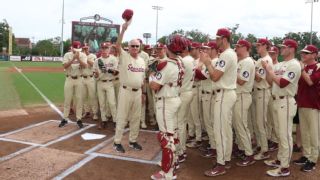 But Martin will be the first to tell you that he never dreamed he would coach baseball. The first coaching dream involved basketball. We are talking about a Carolina boy, after all. When his playing days ended, he started the junior college hoops program at Tallahassee Community College in the early 1970s. The school had no home gym, so the team practiced and played its home games at a local high school. He did that for a few years before moving on to coach high school basketball. One day in the mid-1970s, a friend named Woody Woodward called and said he thought he might be a candidate for the Florida State baseball job. "I said, 'I tell you what. If they offer you the job, I'll go with you," Martin said. Two days later, Woodward got the job at Florida State. He called Martin back and asked him to join his staff. Martin loved his job coaching basketball, but there was no way he could turn down his alma mater. So, Martin became an assistant baseball coach in 1975, earning $2,000. To make ends meet, he also had to teach at the local middle school. When it came time to choose his uniform number, the No. 15 he wore as a player was unavailable. Martin had last choice, and only one uniform left fit him: No. 11. Not too long after that, a player screamed during practice, "Hey, 11, when is batting practice!" The nickname stuck, and Martin came to be known as 11 for his entire coaching career. It was not until 1980 that he took over the program, and even then, there were some who wondered whether Martin had what it took. (Florida State had hired Dick Howser in 1979, but when he left for the New York Yankees after just one season, the Seminoles needed a quick hire.) "We lost the first couple games that year, and when I gave him the game ball for his first win, he was proud but also very relieved to get that first one," said Craig Ramsey, a captain on Martin's 1980 team. "So were we. Making the transition from assistant coach to a head coach with the same group and team, it was tough, but it was great. He's a stickler for the fundamentals but is also an encourager and built confidence in you as a player." 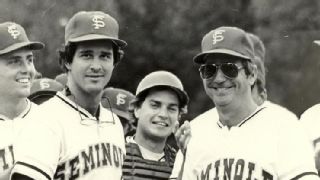 Florida State made the College World Series that year and won 51 games. "We knew there was something special after we got going," said Ramsey, whose son James later played for Martin and made a College World Series in 2011. Soon, Martin widened his recruiting circles to include Puerto Rico, where a prospect named Luis Alicea lived. Alicea spoke no English and had no idea where Florida State was, but he decided to play for the Seminoles in 1984 because he liked their recruiting brochure. When Alicea arrived in Tallahassee, Martin and his son, Mike, came to pick him up from the airport. They asked Alicea what he wanted to eat. Alicea stared at them, unable to understand a word they said. Finally, the younger Martin said, "Chocolate!" and Alicea nodded his head. Alicea got a chocolate shake. In the months after he arrived, Alicea studied English and the coach kept a Spanish-English dictionary handy to help with translations. If all else failed, Martin drew Alicea pictures. "You bring in a kid that doesn't speak English from another country -- he made sure I had whatever I needed to feel comfortable," said Alicea, who played 13 seasons in the majors. "Thanks to that, I was able to have the career I had in college, go on to have a career in the majors and open the door for players that came after." One of those players who came after to Florida State was Eduardo Perez, who grew up playing basketball and baseball in Puerto Rico. "We walked in and we knew that all eyes were on us: Wow, here comes Florida State, no matter what university had to play us," said Perez, who spent 13 seasons in the majors and now is a baseball analyst at ESPN. "And it's not because we won national championships. It's because of consistency and the way we beat you. We could beat you with speed. We could beat you with power. We could beat you with defense. We could beat you on the basepaths. That consistency was always there. We played the game the right way. "Our practices were sometimes an hour of bunting. I had 13 or 14 bunt base hits one year, yet I could also hit the ball out of the ballpark, yet I could also steal 30 bases. The consistency of how to take a lead. All those little things, they won games -- suicide squeezes, safety squeezes. We were like a chameleon." Martin's attention to the fundamentals, to the nuances in the game, to the pure joy he got out of teaching, looking ahead and never backward, allowed the coach and his teams to win year after year, decade after decade. Martin said he runs many of his drills the same way he did in 1980, a testament to his reliance on staying with the three fundamentals he emphasizes to his players in the dugout before each and every game: "Pitching. Defense. Baserunning." As the wins piled up, Martin drew interest from other baseball programs. The school that was the most intrigued was Georgia in the early 2000s. "I happened to be in the house when [athletic director] Vince Dooley called," said Mike Martin Jr., who has worked alongside his dad as an assistant for 22 seasons. "I stopped in my tracks. He did everything he could to get him to leave." But the elder Martin would have none of it. "I couldn't leave because this was home," Martin said. "And this is where our children were born and raised. This is where I wanted to be." Yet Martin almost retired before getting to 2,000 wins. Martin always wanted to leave on his own terms, and he planned to retire following the 2018 season. But a surprising late-season surge got Florida State a top-8 seed in the NCAA tournament. Then-athletic director Stan Wilcox called Martin into his office and said, "Mike, 2,000's not a bad number." Martin had no idea what to say. Wilcox looked at him, waiting for an answer. "You really want me to go another year?" Martin asked. "Like I said, 2,000's not a bad number," Wilcox replied. Martin went home to talk it over with Carol. He decided to coach one more season. He told the team last June that this would be his final season. "In his fashion, it was very low-key, and it was very quick," said current Seminoles third baseman Drew Mendoza. "Immediately, he turned to saying, 'It's all about us, and we've got a really good team; let's make a run for it. And then it was back to business." Martin has wanted to keep the attention off himself and the distractions to a minimum, but it has been impossible. At one point this season, Florida State was an uncharacteristic 21-13. 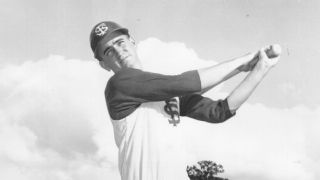 "It's been tough," said the younger Martin. "College kids have enough in their noggins. We were in a death spiral for a while. It was as bad as I'd ever seen it, but he walked in one day and said to the coaching staff, 'I'll fire you if one person in this room tries to do anything with the temperament or mindset of this team. I've got this.' And we pulled out of it. Thank goodness we did, because it was bad." Players said they were not pressing, but it is hard not to wonder whether they all feel an extraordinary amount of pressure to get the coach the one victory that has eluded him most. Though Martin has made 16 College World Series appearances and has those 2,000 victories, he has never won a national championship. "I think it bothers all of us," Perez said. "It does," said Drew, who played in the majors 14 seasons and won a World Series with the Boston Red Sox in 2007. "I made two runs at it. ... College baseball, it's such a difficult thing, and you've got to be hot at the right time and pull the right strings at the right time. And for whatever reason, you're a bunch of 18-year-olds, 19-, 20-year-olds trying to win a national championship. It's a very difficult task at hand for a bunch of kids that are learning to play the game the right way." Nobody will ever catch Martin complaining about the bad luck that has seemed to hurt his teams the most in Omaha, Nebraska, home of the College World Series. Martin desperately wants to win a national championship, but hearing from players such as Ramsey, Alicea and Perez at his retirement celebration only reinforced why he got into coaching in the first place. As Alicea told the crowd that day, "Look at all these trophies that you built. You can't take the plastic thing with you, but you can take the memories of all these guys you've helped. That to me is more important than anything else in life." Martin reflected on his storied career and what is most important. "If I ever said [I had bad luck] to myself, there might be a lot of voices saying, 'You have a nice house. You have the most unbelievable wife a man could ask for. You have three healthy children. You have just about anything a man needs, and you're griping about never winning a national championship?'" Martin said. "How about the number of young men that came up to me at that celebration and hugged my neck and said, 'I love you, 11?' That's a lot more important. That's what I get out of coaching. Do I want to win it? Dadgum right. I wouldn't work so dadgum hard. But I'm not going to say woe is me." 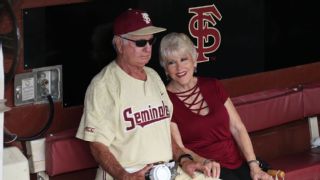 The day after the retirement festivities, Martin prepared for his final home game, his No. 11 gold uniform hanging crisply in his locker an hour before first pitch. He smiled his trademark big smile as he sipped coffee, looking back at how his love for baseball took hold in an abandoned lot off Highway 74 near his house in Charlotte. His daddy never wanted him to play baseball, but that just made Martin want to play even more. "I just grew very, very enamored with the game of baseball and what it creates," Martin said. When it came time to walk to home plate to greet the umpire and Richmond head coach Tracy Woodson before the game, Martin approached the way he always does. It all seemed so routine, until Woodson produced a baseball and asked Martin to sign it. Martin remained at home plate for a brief ceremony, during which the public address announcer read off his many accomplishments to the adoring crowd. The coach tipped his cap, and his players joined him at home plate, clapping along too. Florida State completed the much-needed series sweep, and Mike emerged afterward with Carol. You could say, in a way, the honeymoon never ended.
|

